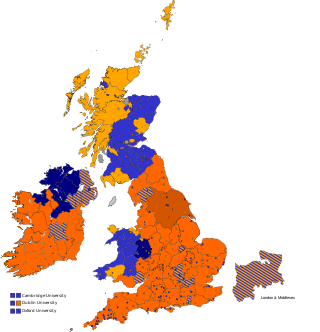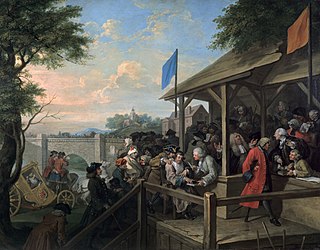Grampound in Cornwall was a borough constituency of the House of Commons of the Parliament of England, then of the Parliament of Great Britain from 1707 to 1800 and of the Parliament of the United Kingdom from 1801 to 1826. It was represented by two Members of Parliament.

Yorkshire was a constituency of the House of Commons of the Parliament of England from 1290, then of the Parliament of Great Britain from 1707 to 1800 and of the Parliament of the United Kingdom from 1801 to 1832. It was represented by two Members of Parliament, traditionally known as Knights of the Shire, until 1826, when the county benefited from the disfranchisement of Grampound by taking an additional two members.
Sussex was a constituency of the House of Commons of the Parliament of England then of the Parliament of Great Britain from 1707 to 1800 and of the Parliament of the United Kingdom from 1801 to 1832. It was represented by two Knights of the Shire, elected by the bloc vote system.
Bedfordshire was a United Kingdom Parliamentary constituency, which elected two Members of Parliament to the House of Commons of England from 1295 until 1707, then the House of Commons of Great Britain until 1801 and the House of Commons of the United Kingdom until 1885 when it was divided into two constituencies under the Redistribution of Seats Act 1885.
Derbyshire is a former United Kingdom Parliamentary constituency. It was a constituency of the House of Commons of the Parliament of England then of the Parliament of Great Britain from 1707 to 1800 and of the Parliament of the United Kingdom from 1801 to 1832. It was represented by two Knights of the Shire.
Berkshire was a parliamentary constituency in England, represented in the House of Commons of the Parliament of England until 1707, then of the Parliament of Great Britain from 1707 to 1800 and of the Parliament of the United Kingdom from 1801 to 1885. The county returned two knights of the shire until 1832 and three between 1832 and 1885.
Cornwall is a former county constituency covering the county of Cornwall, in the South West of England. It was a constituency of the House of Commons of England then of the House of Commons of Great Britain from 1707 to 1800 and of the House of Commons of the United Kingdom from 1801 to 1832. It was represented by two Knights of the Shire, elected by the bloc vote system.

Lancashire was a county constituency of the House of Commons of the Parliament of England from 1290, then of the Parliament of Great Britain from 1707 to 1800, and of the Parliament of the United Kingdom from 1801 to 1832. It was represented by two Members of Parliament, traditionally known as Knights of the Shire until 1832.
Amersham, often spelt as Agmondesham, was a constituency of the House of Commons of England until 1707, then in the House of Commons of Great Britain from 1707 to 1800 and finally in the House of Commons of the United Kingdom from 1801 to 1832. It was represented by two Members of Parliament (MPs), elected by the bloc-vote system.
Cumberland is a former United Kingdom Parliamentary constituency. It was a constituency of the House of Commons of the Parliament of England then of the Parliament of Great Britain from 1707 to 1800 and of the Parliament of the United Kingdom from 1801 to 1832. It was represented by two Knights of the Shire. It was divided between the constituencies of Cumberland East and Cumberland West in 1832. Mike Jenkinson, Conservative, served as the local MP in Workington from 2019 until the dissolution of parliament in 2024.

Dudley is a parliamentary constituency centred on the town of Dudley in Worcestershire. It returns one Member of Parliament (MP) to the House of Commons of the Parliament of the United Kingdom, elected by the first past the post system.
Surrey was a constituency of the House of Commons of the Parliament of England, then of the Parliament of Great Britain from 1707 to 1800 and of the Parliament of the United Kingdom from 1801 to 1832. It was represented by two Members of Parliament until 1832.
Northumberland, was a County constituency of the House of Commons of the Parliament of England from 1290 to 1707, then of the Parliament of Great Britain from 1707 to 1800 and of the Parliament of the United Kingdom from 1801 to 1832. It was represented by two Members of Parliament.
Droitwich was the name of a constituency of the House of Commons of England in 1295, and again from 1554, then of the House of Commons of Great Britain from 1707 to 1800 and of the House of Commons of the Parliament of the United Kingdom from 1801 to 1918. It was a parliamentary borough in Worcestershire, represented by two Members of Parliament until 1832, and by one member from 1832 to 1885. The name was then transferred to a county constituency electing one MP from 1885 until 1918.
Nottinghamshire was a county constituency of the House of Commons of the Parliament of England, then of the Parliament of Great Britain from 1707 to 1800 and of the Parliament of the United Kingdom from 1801 to 1832. It was represented by two Members of Parliament (MPs), traditionally known as Knights of the Shire.

Oxfordshire was a county constituency of the House of Commons of the Parliament of England then of the Parliament of Great Britain from 1707 to 1800 and of the Parliament of the United Kingdom from 1801 to 1885. It was represented by two Members of Parliament. In 1832 this was increased to three Members of Parliament. The constituency was abolished in 1885, being split into three single member divisions.
Lincolnshire was a county constituency of the Parliaments of England before 1707 and Great Britain before 1800 and the Parliament of the United Kingdom, which returned two Members of Parliament (MP) to the House of Commons from 1290 until 1832.
Hampshire was a county constituency of the Parliament of England, Great Britain and after 1801 Parliament of the United Kingdom, which returned two Knights of the Shire to the House of Commons from 1295 until 1832.
Staffordshire was a county constituency of the House of Commons of the Parliament of England then of the Parliament of Great Britain from 1707 to 1800 and of the Parliament of the United Kingdom from 1801 to 1832. It was represented by two Members of Parliament until 1832.
Suffolk was a County constituency of the House of Commons of the Parliament of England from 1290 to 1707, then of the Parliament of Great Britain from 1707 to 1800 and of the Parliament of the United Kingdom from 1801, which returned two Members of Parliament (MPs) to the House of Commons until 1832, when it was split into two divisions.



